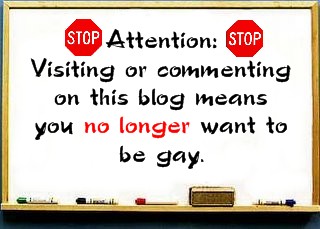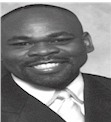 That pretty much describes the notion held by some gay activists that former homosexuals, unless they become completely invisible are evidently still wanting to be gay. I've heard it so many times, it has become like grandma's old snuff can on the back porch. The latest to pull it out --defensively I might add--- is Jasmyne Cannick, an LA based lesbian activist. Since she admitted confusion over the issue, I feel responsible to help clear her mind. We'll see where it goes from there.
That pretty much describes the notion held by some gay activists that former homosexuals, unless they become completely invisible are evidently still wanting to be gay. I've heard it so many times, it has become like grandma's old snuff can on the back porch. The latest to pull it out --defensively I might add--- is Jasmyne Cannick, an LA based lesbian activist. Since she admitted confusion over the issue, I feel responsible to help clear her mind. We'll see where it goes from there.
"As I’ve said all along, my experience has shown that the people who are the most homophobic also tend to be dealing with their own issues about their sexuality. People who are comfortable with their sexuality usually don't care as much about other people's sexuality. Which leads me to an obvious question. Are these ex-gays … still gay?" [Source]First, let's list the assumptions of Cannick's statement.
1. Assumes that homophobia is an automatic condition of opposition to homosexual activism.
2. Assumes that homophobia parallels sexual identity confusion.
3. Assumes that being "comfortable" with one's sexuality is the result of being silent about it.
4. Assumes that exgays or former homosexuals are guilty of such assumptions.
5. Additionally, Cannick assumes that posting on or viewing her blog and presumablably any blog written by a gay person constitutes a desire to be gay again.
Now, let's assume Cannick is correct in these assumptions. And if she's is correct, the law of reciprocity would make such statements applicable to her or other gays. Right?
Then consider this:
1. Cannick did a weeklong series highlighting the "sexuality" of various black preachers. If she were comfortable with her own sexuality, why would she be that concerned with theirs?
2. Plenty of gays visit and post on my blog, one written by a former homosexual. Using her logic, these gays secretly want to get rid of their homosexuality simply by visiting and posting on my blog.
3. I always thought dissent was dissent and debate was debate. Yet, in Cannick's narrow worldview, all dissension, apart from her definitional branding is "homophobia". That could possibly indicate you fear your opponent's views, rather than feel secure in your own.
4. If "exgays" should not express themselves openly or talk about their faith or try to help others who do not want to be gay, why is Cannick taking that privelege for herself? Isn't that called hypocrisy?
5.Cannick's apparent fear and hurt over the Christian conversion of VENUS magazine publisher Charlene Cothran should remain personal. Projecting it onto "exgays" is an immature way to resolve personal dilemmas.
The larger question is why homosexual activists would turn so quickly on person who was once a integral part of their culture and mission? We'll leave that for another post.

No comments:
Post a Comment